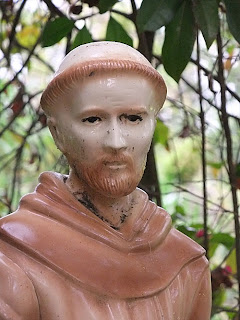Answering the Call (Blogging the Lectionary)
 |
| (just so there's a picture) |
Gospel this Sunday: Matthew 25:14-30
Diana Butler Bass posted yesterday on Facebook that she has been preaching on these Matthean parables as she visits churches and speaks at conferences and that that has really transformed her understanding of them.
And after I asked her if she would consider releasing those sermons, I thought: "wait a minute, haven't I been doing the same thing?"
I went back and looked at my posts on these "the kingdom is like" parables. I found I didn't like a single one of them, that they didn't fit my theology, that I had to dig deeper.
I identify with the third slave who buried the money he's been given. I don't like the whole judgeyness.
Again.
And I've realized that what I've had to dig deeper past is my theology, that I am so quick to believe that God is Judgemental and Mean, even though I profess to believe in a God of love. Remnants of a theology that was somehow a part of the formation of my character. That has sent me into a tailspin of darkness if I even think I've done wrong. I have a better handle on the latter these days, but it's still there.
I am quick to believe that this landowner equals God and he is cruel and gathers where he does not sow and yet, this is the same God who sows love indiscriminately on all kinds of ground. This same God whose love I have experienced.
And I'm like, crap, how did I forget that?
I have to dig past my baggage, beyond this false theology and false-self-ology, to find truths in these parables.
A talent of gold, I have learned in my reading, is about 15 years of poverty-level earnings. That's a lot of coin. In other words, it took some serious effort for the third slave to move and bury what he has been given.
It's a conscious act of rebellion. Like the no-wedding-robe guy in the wedding banquet parable, the third slave refuses what is offered and is even too afraid to keep the abundant coin for himself.
Perception is everything. Presumably, the other two slaves did not think of their master in the same way, for if the man was harsh and cruel, with the amount of money they were given, they could have run away and made new lives for themselves. Easy.
The wailing and gnashing of teeth is life without the God of love. The third slave is already there, along with the no-wedding-robe guy not just because they refuse God, but they cannot see that God is love.
I have days like that, don't you? When I don't even think to call out to God in thanksgiving, or in need and instead I suffer in a darkness of my own making (like the foolish bridesmaids who forgot their oil). I forget about God.
These kingdom parables are a call to that life-giving love of God and the kingdom that is near-here. Answering that call is a step toward transformation, resurrection, and finding our place in helping make the kingdom of God fully present.
Amen.


Comments
Post a Comment
Thank you for taking the time to leave a comment.